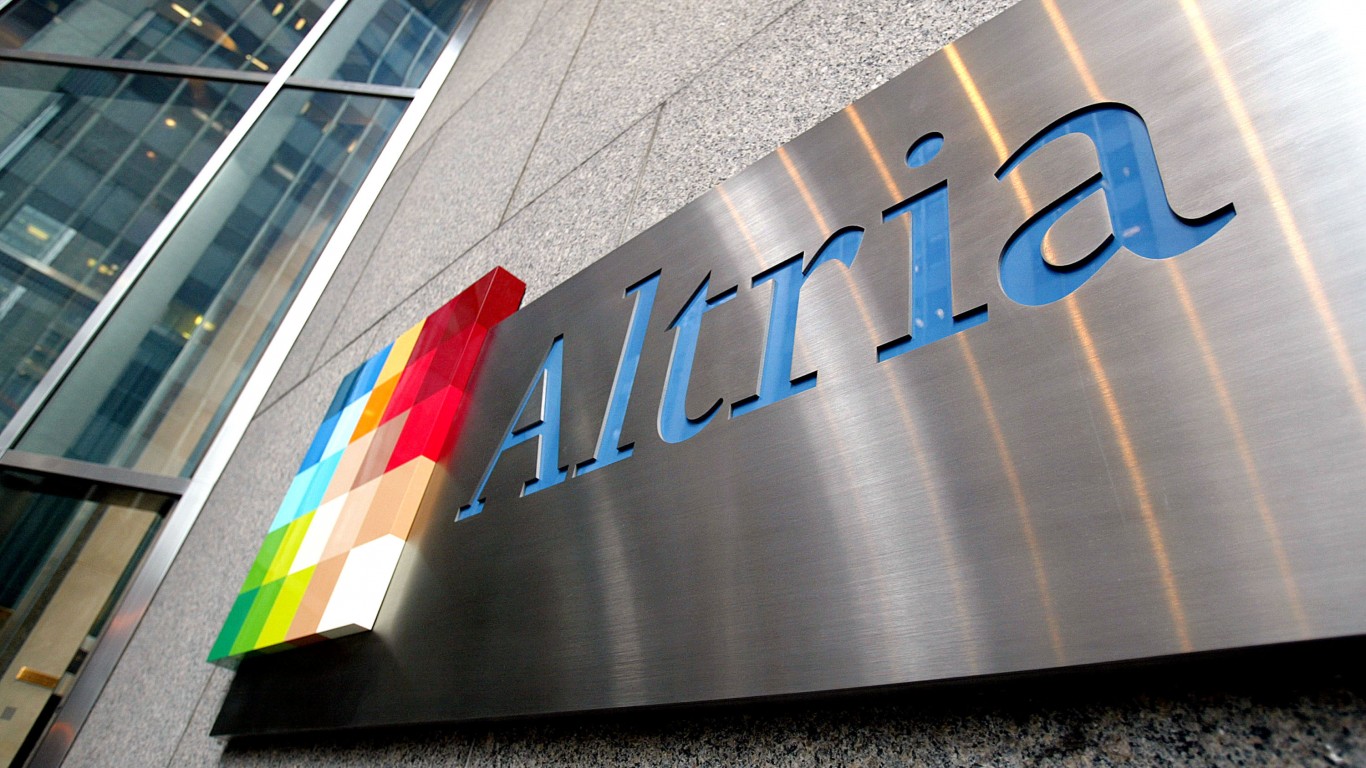

Investors love dividend stocks because they provide dependable income and give investors a great opportunity for solid total return. Total return includes interest, capital gains, dividends, and distributions realized over time. In other words, the actual investment or portfolio return consists of income and stock appreciation.
At 24/7 Wall St., we always like to remind our readers about the impact total return has on portfolios because it is one of the best ways to help improve the chances for overall investing success. Again, total return is the combined increase in a stock’s value plus dividends.
For instance, if you buy a stock at $20 that pays a 3% dividend, and it goes up to $22 in a year, your total return is 13%—10% for the increase in stock price and 3% for the dividends paid.
We screened our 24/7 Wall St. ultra-yield dividend research database and found seven top companies for investors seeking dependable, big, passive income streams.
Altria

This maker of tobacco products offers value investors a great entry point now and pays a rich 9.75% dividend. Altria Group Inc. (NYSE: MO) manufactures and sells smokable and oral tobacco products in the United States through its subsidiaries.
The company provides cigarettes primarily under the Marlboro brand;
- Cigars and pipe tobacco, principally under the Black & Mild brand
- Moist smokeless tobacco and snus products under the Copenhagen, Skoal, Red Seal, and Husky brands
- on! Oral nicotine pouches.
Altria also owns over 10% of Anheuser-Busch InBev (NYSE: BUD), the world’s largest brewer, which some feel is worth more than $10 billion and a segment of the company that could be sold. Given the public relations disaster the company has gone through this year, it could be on the chopping board.
In June of 2023, the company purchased NJOY Holdings, which makes electronic cigarettes and vaping products, for a consideration of $2.75 billion. The company has increased its dividend for 52 consecutive years. (How safe is Altria stock’s dividend?)
Arbor Realty Trust

This company trades at a ridiculous 6.9 times trailing earnings and pays a massive 14.13% dividend. Arbor Realty Trust (NYSE: ABR) invests in a diversified portfolio of structured finance assets in the multifamily, single-family rental, and commercial real estate markets in the United States.
The company operates in two segments:
- Structured Business
- Agency Business.
Arbor Realty Trust primarily invests in bridge and mezzanine loans, including junior participating interests in first mortgages and preferred and direct equity, as well as real estate-related joint ventures, actual estate-related notes, and various mortgage-related securities.
The company offers bridge financing products to borrowers who seek short-term capital to be used in an acquisition of property;
- Financing by making preferred equity investments in entities that directly or indirectly own real property
- Mezzanine financing in the form of loans that are subordinate to a conventional first mortgage loan and senior to the borrower’s equity in a transaction
- Junior participation financing in the form of a junior participating interest in the senior debt
- Financing products to borrowers who are looking to acquire conventional, workforce, and affordable single-family housing
Further, it underwrites, originates, sells, and services multifamily mortgage loans through conduit/commercial mortgage-backed securities programs.
Energy Transfer

The top master limited partnership is a safe way for investors looking for energy exposure and income as the company pays a massive 9.40% distribution. Energy Transfer L.P. (NYSE: ET) owns and operates one of the largest and most diversified portfolios of energy assets in the United States, with a strategic footprint in all of the major domestic production basins.
The company is a publicly traded limited partnership with core operations that include:
- Complementary natural gas midstream
- Intrastate and interstate transportation and storage assets
- Crude oil, natural gas liquids (NGL), and refined product transportation and terminalling assets
- NGL fractionation and various acquisition and marketing assets.
After the purchase of Enable Partners in December of 2021, Energy Transfer owns and operates more than 114,000 miles of pipelines and related assets in all of the major U.S. producing regions and markets across 41 states, further solidifying its leadership position in the midstream sector.
Through its ownership of Energy Transfer Operating, L.P., formerly known as Energy Transfer Partners, L.P., the company also owns Lake Charles LNG Company, as well as the general partner interests, the incentive distribution rights, and 28.5 million standard units of Sunoco L.P. (NYSE: SUN), and the public partner interests and 39.7 million standard units of USA Compression Partners L.P. (NYSE: USAC).
FS KKR

This is a well-known name on Wall Street, offers a solid entry point at current levels, and pays a massive 14.18 dividend. FS KKR Capital Corp. (NASDAQ: FSK) is a business development company specializing in investments in debt securities. It seeks to purchase interests in loans through secondary market transactions or directly from the target companies as primary market investments.
The company also seeks to invest in:
- First-lien senior secured loans,
- Second-lien secured loans
- Subordinated loans or mezzanine loans
In connection with the debt investments, the firm also receives equity interests such as warrants or options as additional consideration. It also seeks to purchase minority interests in common or preferred equity in our target companies, either in conjunction with one of the debt investments or through a co-investment with a financial sponsor.
It aims to invest in small and middle-market companies in the United States. The fund seeks to invest in firms with annual revenue between $10 million to $2.5 billion. It aims to exit from securities by selling them in a privately negotiated over-the-counter market.
The company posted stellar results for the most recent quarter and announced a continuation of a massive stock buyback.
Highwoods Properties

Trading just above a 52-week low, this company pays a stellar 11.06% dividend and has enormous upside potential. Highwood Properties Inc. (NYSE: HIW) is a fully integrated office real estate investment trust.
The company owns, develops, acquires, leases, and manages properties primarily in the best business districts (BBDs) of:
- Atlanta
- Charlotte
- Dallas
- Nashville
- Orlando
- Raleigh
- Richmond
- Tampa
Highwoods Properties’ biggest customers include the U.S. Government, financial services firms, industrial supply retailers, and healthcare companies.
Mach Natural Resources

This 2023 IPO is trading below the initial price and will pay an estimated gigantic 16% dividend. Mach Natural Resources (NYSE: MNR) is an independent upstream oil and gas company focused on the acquisition, development, and production of oil, natural gas, and natural gas liquids reserves in the Anadarko Basin region of Western Oklahoma, Southern Kansas, and the panhandle of Texas.
The analysts at Raymond James noted that the company is led by Tom Ward, Co-Founder of Chesapeake Energy; Mach is another entrant into the E&P MLP space. MNR is a pure-play operator in the Anadarko Basin, leveraging its strong position (1 million net acres) to become the primary consolidator in the region.
Mach’s midstream position and lower base decline (~20%) allow the company to target a lower reinvestment rate (~30%) relative to the overall industry.
Starwood Property Trust

This is a high-yielding company run by real estate legend Barry Sternlicht that offers big-time total return potential and a 9.28% dividend. Starwood Property Trust Inc. (NYSE: STWD) operates as a real estate investment trust (REIT) in the United States, Europe, and Australia. It operates through four segments: Commercial and Residential Lending, Infrastructure Lending, Property, and Investing and Servicing segments.
The Commercial and Residential Lending segment:
- Originates, acquires, finances, and manages commercial first mortgages
- Non-agency residential mortgages
- Subordinated mortgages
- Mezzanine loans
- Preferred Equity
- Commercial mortgage-backed securities (CMBS)
- Residential mortgage-backed securities
The Infrastructure lending segment originates, acquires, finances, and manages infrastructure debt investments.
The Property segment primarily develops and manages equity interests in stabilized commercial real estate properties, such as multifamily properties and commercial properties subject to net leases, that are held for investment.
The Investing and Servicing segment manages and works out problem assets:
- Acquires and contains unrated, investment grade and non-investment grade rated CMBS comprising subordinated interests of securitization and re-securitization transactions;
- Originates conduit loans for the primary purpose of selling these loans into securitization transactions
- Acquires commercial real estate assets that include properties received from CMBS trusts.
Sponsored: Find a Qualified Financial Advisor
Finding a qualified financial advisor doesn’t have to be hard. SmartAsset’s free tool matches you with up to 3 fiduciary financial advisors in your area in 5 minutes. Each advisor has been vetted by SmartAsset and is held to a fiduciary standard to act in your best interests. If you’re ready to be matched with local advisors that can help you achieve your financial goals, get started now.
Thank you for reading! Have some feedback for us?
Contact the 24/7 Wall St. editorial team.



